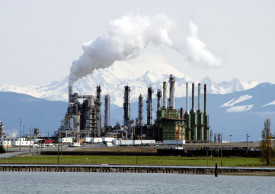The Oregonian has a surprisingly good article on national politics and public forests in the West. The hottest political topics: “healthy forests” and “the roadless rule” may matter less than we think. The crux:
All the posturing may have little to do with what really happens in Western forests. Land managers have been trying to cull flammable stands for years and will keep at it no matter who wins the election. And timber companies show little interest in cutting down roadless forests, which generally remain roadless because they have limited commercial value and are remote and difficult to reach.
And more:
Western forests have been political playthings for years. President Clinton cast a protective blanket over 58.5 million acres of roadless national forests in his final days in the White House, leaving a conservation legacy that environmentalists saw as one of their greatest victories in decades.
But the Clinton administration’s own assessment found those lands in no great peril at the time. No matter what happened, it said, at most 1 percent of roadless forests were likely to be logged in the next five years, reflecting scarcely a half-percent of national timber production, and much of that would be trees already killed by fire, insects and disease.
Roadless areas matter a lot, as we noted last week. And road building continues unabated in British Columbia.
But forest practices on already-roaded land may be the area where policy changes now make the biggest difference in the Northwest states, as discussed here.







